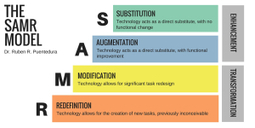Today’s global employers are searching for employees that have specific skills. Those skills may not be the same needed in 10 years though. In 2009, the US Department of Labor estimated 65% of today’s school children would eventually be employed in jobs that have yet to be created. The number is far higher today. The influx of technology is what has changed the shape of education forever. For this reason, schools must create opportunities for students to engage in higher level thinking skills and experience 21st century skills while using technology.
Learn more / En savoir plus / Mehr erfahren:
http://www.scoop.it/t/21st-century-learning-and-teaching/?&tag=Hybrid-Learning
http://www.scoop.it/t/21st-century-learning-and-teaching/?&tag=Blended+Learning...
http://www.scoop.it/t/21st-century-learning-and-teaching/?&tag=Hybrid+Pedagogy
http://www.scoop.it/t/21st-century-learning-and-teaching?tag=Critical-Thinking
https://gustmees.wordpress.com/2015/05/26/what-are-the-skills-needed-from-students-in-the-future/
Via Nik Peachey, Gust MEES



 Your new post is loading...
Your new post is loading...












Good to see critical thinking so high up the list.
Learn more / En savoir plus / Mehr erfahren:
http://www.scoop.it/t/21st-century-learning-and-teaching/?&tag=Hybrid-Learning
http://www.scoop.it/t/21st-century-learning-and-teaching/?&tag=Blended+Learning...
http://www.scoop.it/t/21st-century-learning-and-teaching/?&tag=Hybrid+Pedagogy
http://www.scoop.it/t/21st-century-learning-and-teaching?tag=Critical-Thinking
https://gustmees.wordpress.com/2015/05/26/what-are-the-skills-needed-from-students-in-the-future/